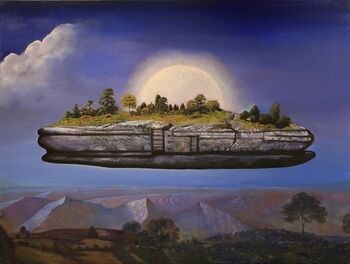Utopia
 | |
| Founder(s) | Sir Thomas More |
| Interest of | Scientism/Invisible College |
A utopia is an imagined community or society that possesses highly desirable or nearly perfect qualities for its citizens. The term was coined by Sir Thomas More for his 1516 book Utopia, describing a fictional island society in the south Atlantic Ocean off the coast of South America.[1] The opposite of a utopia is a dystopia, which dominates sci-fi literature.
A utopia focuses on equality in such categories as economics, quality of living, health, education, government, justice, with the method and structure of proposed implementation varying based on ideology. Some argue that utopia's nature is inherently contradictory because societies are not homogeneous and have desires which conflict and therefore cannot simultaneously be satisfied.
There are socialist, capitalist, monarchical, democratic, anarchist, ecological, matriarchal, patriarchal, egalitarian, hierarchical, racist, left-wing, right-wing, religious, free love, nuclear family, extended family, gay, lesbian, technocratic, high-intelligence and many more utopias.
A solution to circumvent this is to make humans more equal and push all individuality out of society.